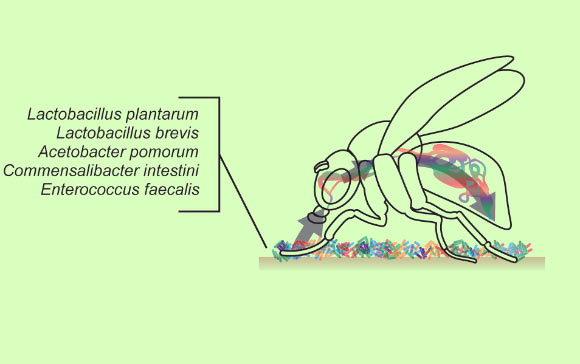In a study published recently in the journal PLOS Biology, neuroscientists identified three gut bacteria species — Acetobacter pomorum, Lactobacillus plantarum and L. brevis — that have an impact on animal dietary decisions.

According to Leitao-Goncalves et al, gut bacteria control food choice and egg laying in Drosophila melanogaster. Image credit: Leitao-Goncalves et al, doi: 10.1371/journal.pbio.2000862.
What animals, including humans, choose to eat has a big impact on health and wellbeing.
Though intake of dietary proteins and amino acids is essential for animals, excessive consumption of these nutrients is known to have detrimental effects.
Many animals, therefore, execute precise control over the intake of these key nutrients. However, the factors controlling protein appetite are poorly understood.
Experiments conducted using the fruit fly (Drosophila melanogaster) allowed an international team of neuroscientists to dissect the complex interaction of diet, brain, and gut bacteria.
The team, headed by Dr. Carlos Ribeiro of the Champalimaud Centre for the Unknown in Lisbon, Portugal, showed that flies deprived of amino acids showed decreased fertility and increased preference for protein-rich food.
Indeed, the authors found that the removal of any single essential amino acid was sufficient to increase the flies’ appetite for protein-rich food.
“Animals are constantly being faced with different diets of uneven quality. To deal with this challenge, they can alter their food choices,” said co-author Dr. Zita Carvalho-Santos, also from the Champalimaud Centre for the Unknown.
Furthermore, the researchers tested the impact on food choices of five different species of bacteria (Lactobacillus plantarum, Lactobacillus brevis, Acetobacter pomorum, Commensalibacter intestine, and Enterococcus faecalis) that are naturally present in the guts of fruit flies in the wild.
The results exceeded the team’s expectations: Lactobacilli and Acetobacter pomorum could abolish the increased appetite for protein in flies that were fed food lacking essential amino acids.
“With the right microbiome, fruit flies are able to face these unfavorable nutritional situations,” Dr. Carvalho-Santos said.
“In the fruit fly, there are five main bacterial species; in humans there are hundreds,” added co-author Dr. Ana Patrícia Francisco, also from the Champalimaud Centre for the Unknown.
This highlights the importance of using simple animal models to gain insights into factors that may be crucial for human health.
“How could the bacteria act on the brain to alter appetite? Our first hypothesis was that these bacteria might be providing the flies with the missing essential amino acids,” Dr. Santos said.
“However, the experiments did not support this hypothesis. Instead, the gut bacteria seem to induce some metabolic change that acts directly on the brain and the body, which mimics a state of protein satiety.”
This work shows not only that gut bacteria act on the brain to alter what animals want to eat, but also that they might do so by using a new, unknown mechanism.
_____
R. Leitão-Gonçalves et al. 2017. Commensal bacteria and essential amino acids control food choice behavior and reproduction. PLoS Biol 15 (4): e2000862; doi: 10.1371/journal.pbio.2000862







